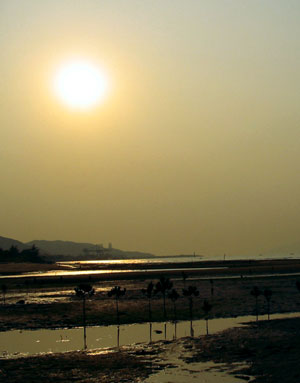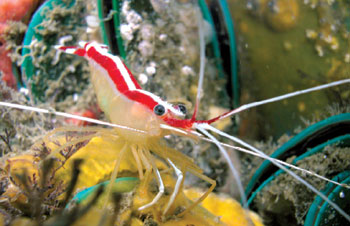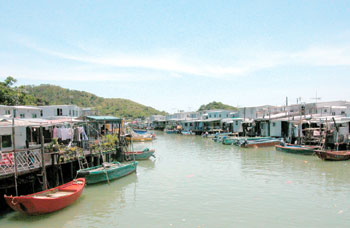Periscope
Related Stories

Take a walk to Hong Kong 's living treasures
By Oscar Chan
Hong Kong is one of the world's largest nature conservations. Away from hustle and bustle, we hear the humming symphony of the nature.
EcoTour Travel Limited organizes travel packages that teach its clients to appreciate, treasure and maintain the ecology in Hong Kong . The agency's mission is to promote and organize educational activities that help people understand more about local ecology.
Ken Cheung, the founder of the Eco Travel Limited, said that he had the concept of the eco-tour agency in 1996 and established it in 1998.
“I was a part-time tour guide before I had my own company. In one of my trips to Bali , I observed the management of Bali 's water areas. The water areas were divided into diving zone, water skiing zone, and other water sports zones. You wouldn't find someone skiing above your head when you are diving. The managing team obtained adequate information of the water environment. They had regular checks and applied some rules as they knew the corals in the shallows are prone to damage. What impressed me much was that the visitors were not allowed to use shampoos, cleansing foam or any chemical bathing products. I was overwhelmed by their earnestness for conservation,” Ken said.
He recalled what really inspired him to think about establishing an agency offering environmental education.
“After playing in the sea, we had lunch on the beach. Some Hong Kong tourists in my group threw the shells of fried shrimps into the water, which attracted thousands of tuna. The group was extremely excited but other foreign tourists were so annoyed because after the tuna show there was a layer of oil on the surface of the water,” he said.
Ken said that after that trip, he wanted to promote environmental protection by establishing an eco-tour agency. And back then, “eco-tour” was a rather green idea.
“By that time, ecotourism meant visiting nature with the minimum impact on the environment. I contacted some organizations in Australia and realized that experts in ecology may not be suitable to engage in ecotourism, because they might lack presentation skills or hospitality to energize the travelers. In the end, I decided to try it out by myself,” Ken said.
According to the International Ecotourism Society, ecotourism is defined as “responsible travel to natural areas that conserves the environment and improves the well-being of local people”.
Ken further elaborated that ecotourism is a nature-based tourism in which travelers are expected to see and appreciate the nature as well as the culture of the place.
“Ecotourism is an environmental education rather than entertaining activity. It can become a long-term development project in some locations. It has brought a considerable income to some foreign countries,” he said.
Ken's company used to organize most tours for schools but now he has more corporate clients.
“Starting from 2003, more corporations hire us to organize trips for their employees. I think it is a requirement for the corporations to fulfill what International Organizations for Standardization (ISO) suggest,” Ken said.
Hong Kong is a nice place for ecotourism because travelers can visit different spots by convenient transportation. However, Ken said that ecotourism is still not popular in Hong Kong .
“ Hong Kong is such a busy city and the people are not willing to pay for nature visits. We had a hard time at the beginning of the business as the public was not interested. Our promotion seemed to be ineffective and not many people joined our trips,” he said.
Ken admitted that the profit was just enough to cover the cost. Despite the limited support, Ken's company keeps receiving helping hands.
“We looked for a company which provides printing services at a very low cost and the owners of tour buses and ships have been offering us discounts. We only have three full-time staff in the company. Other workers are mainly volunteers. Some of them were our tours' clients before,” Ken said.
He commented that the government does not bother with the development of ecotourism. He said, “The Hong Kong Government does not hold a clear direction in ecotourism. The government once boosted ecotourism during the SARS. They organized tours to sites of special scientific interest and encouraged people to visit rural areas and appreciate nature. Ironically, I saw people who went there picking up starfish to bring them home. The implementation was not well-planned and the travelers were not told about what they should not do.”
To help develop ecotourism, Ken believes it is a must to realize the importance of the ecology and its impact.
“The government must first set up a committee that investigates the possibility of the development of the ecotourism in Hong Kong . Professional training should be provided to ecotour guides. Guides who are professional in ecotourism do not have any formal qualifications to credit their knowledges. Training of tour guides can also ensure that they are correctly informed about the rules of ecotouring,”
“And the government may also consider setting up regulations concerning eco-tours,” Ken said.
More Asian countries such as Philippines and China are developing their ecotourism. Ken believes that Hong Kong must grasp more information and put more effort to catch up with them and to contribute to the environment.

In ecotour, secondary students study the river ecology in Sha Lo Tung, which is zoned 廍"Site of Special Scientific Interest" Courtesy of Ken Cheung

Ken said snorkeling is one of the most popular activities. Courtesy of Ken Cheung

Family-tour visiting Pak Nei, a coastal wetland. Courtesy of Ken Cheung
Hong Kong biodiversity database
By Oscar Chan
According to the World Wide Fund for Nature Hong Kong's Ecological Database published in 1993, Hong Kong has 210 species of seaweeds, 175 species of ferns, 1,900 species of flowering plants, 2,000 species of moths, 96 species of freshwater fish, 23 species of amphibians, 78 species of reptiles, 465 species of birds, 239 species of butterflies, and 57 species of mammals.
A recent survey shows that there has been an continuous increasing in the numbers of some local species. The species of dragonflies increased from 93 to 107 in 1993. 2,032 species of butterflies have been discovered in Hong Kong , which is one-sixth of the total butterflies' species in China , according to the HKNature.net.
Hong Kong is also a wonderland for endangered animals. Every winter, up to 135 Black-faced Spoonbills ( Platalea Minor) visit Mai Po. According to the World Wide Fund for Nature Hong Kong, there are less than 1000 Black-faced Spoonbills in the world.
The Agriculture, Fisheries and Conservation Department said that Romer's Tree Frog ( Philautus romeri ) is a unique species that only exists in Hong Kong and nowhere else on earth.
“Dragonfly” is the“winged jewls” of Hong Kong because it has a significant number of dragonfly species. Sha Lo Tung is the home of sixty eight dragonfly species, which is nearly 65 percent of known dragonfly species in Hong Kong .
According to Agriculture, Fisheries and Conservation Department, Hong Kong is a stopover along the East-Asian-Australasian flyway and the fact keeps bringing much happiness to local birdwatchers.




